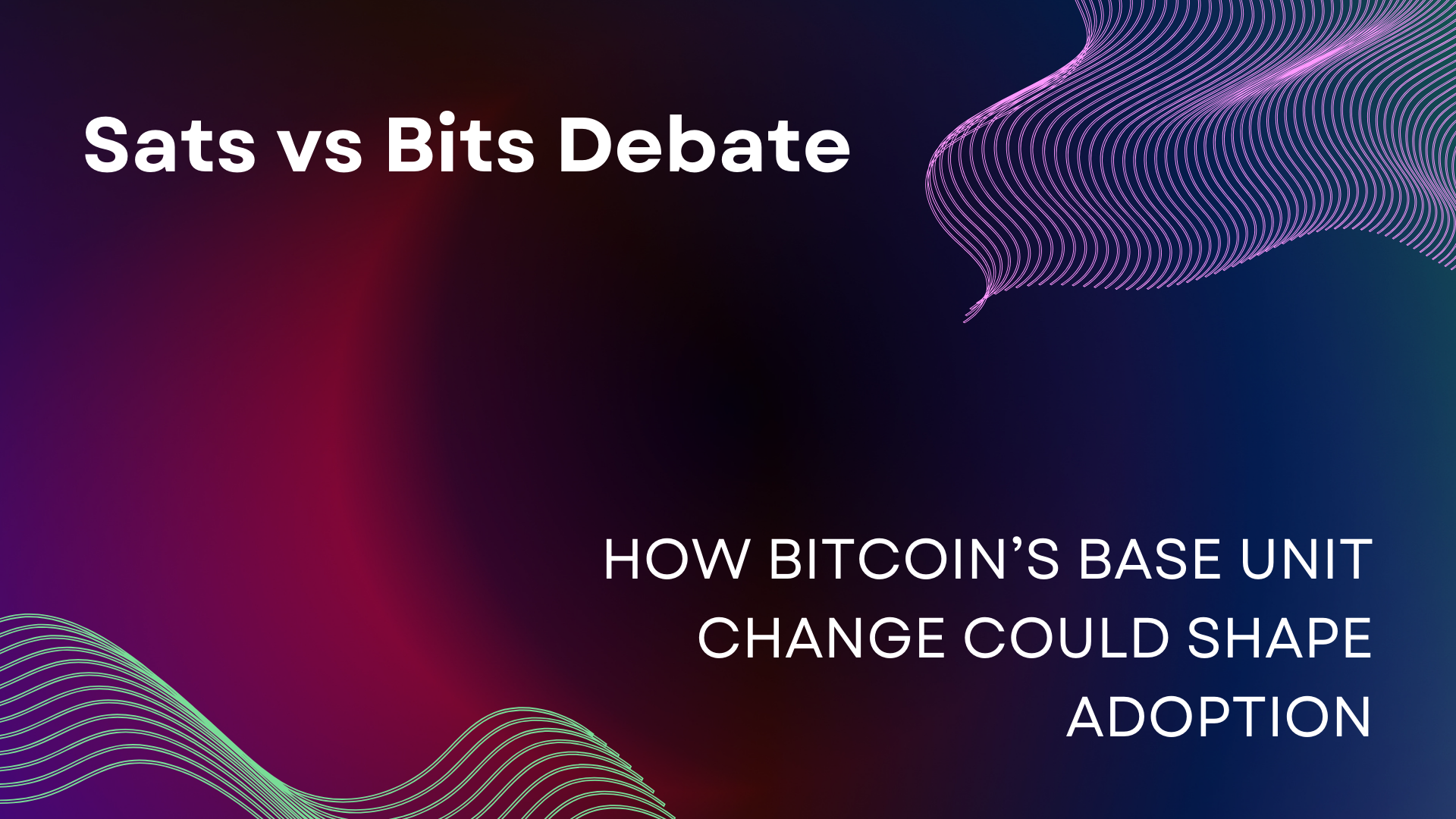
Introduction
Bitcoin’s adoption faces a pivotal debate: should the cryptocurrency transition from satoshi (sats) to bits as its base unit? This discussion, fueled by a recent Bitcoin Improvement Proposal (BIP), has sparked intense debate among developers, users, and merchants. Proponents argue that switching to bits could simplify adoption and microtransactions, while critics warn it risks diluting Bitcoin’s core identity tied to its creator, Satoshi Nakamoto. This article explores the Sats vs. Bits controversy, its implications, and what it means for Bitcoin’s future.
Understanding Satoshi (Sats) and Bits
- Satoshi (sats): The smallest unit of Bitcoin, named after creator Satoshi Nakamoto.
- 1 BTC = 100,000,000 satoshis.
- Advocates argue sats symbolize Bitcoin’s precision and cultural ties to its origins.
- Bit: A proposed base unit where 1 BTC = 1,000,000 bits.
- Proposed in a recent BIP to simplify decimal tracking and enable smaller transactions.
The BIP Proposal: What’s at Stake?
A BIP (Bitcoin Improvement Proposal) circulating in late 2024 suggests adopting bits as Bitcoin’s standard unit. Key points include:
- Simplification: Reducing the number of decimal places from 8 (sats) to 6 (bits) could ease user interfaces and microtransactions.
- Accessibility: Merchants and users might find bits more intuitive for everyday payments (e.g., 0.001 BTC vs. 1 bit).
However, critics argue this undermines Bitcoin’s foundational principles:
- Historical Significance: Sats honor Satoshi Nakamoto’s legacy. Changing units risks alienating long-term supporters.
- Technical Complexity: Updating wallets, exchanges, and protocols to support bits could introduce bugs or security risks.
Pro-Bits Arguments: Easier Adoption and Microtransactions
Supporters of the BIP highlight benefits like:
- User-Friendly Transactions:
- Bits reduce the need for complex decimal calculations. For example, a $5 coffee priced at 0.00005 BTC becomes 5 bits.
- Microtransactions Scalability:
- Bits could lower fees for small payments, making Bitcoin viable for everyday purchases.
- Merchant Appeal:
- Businesses might prefer bits for inventory tracking and customer billing.
Example:
A microtransaction platform using bits could charge 0.1 bit ($0.05) for a digital download instead of 0.00001 BTC, simplifying accounting.
Pro-Sats Arguments: Precision and Cultural Identity
Opponents stress that sats are integral to Bitcoin’s ethos:
- Decentralized Precision:
- Sats allow fractional ownership down to the 8th decimal, enabling equitable distribution.
- Cultural Symbolism:
- “Sats” have become a cultural shorthand for Bitcoin’s grassroots movement, much like “shares” in stocks.
- Developer Resistance:
- Core developers argue that bits could fragment the ecosystem, with some platforms adopting sats and others bits.
Historical Precedent:
The “Satoshis to the People” movement emphasizes that even small sats (e.g., 100,000 sats = $1) empower financial inclusion.
Market and Community Reaction
- Reddit and Twitter Debates:
- Pro-bit users cite ease of use, while pro-sat advocates label the proposal “Satoshi’s betrayal.”
- Merchant Surveys:
- A CoinTelegraph poll found 60% of merchants prefer sats for their granularity, but 35% see bits as a gateway for new users.
- Technical Concerns:
- Developers warn that unit changes could require updates to wallets, exchanges, and smart contracts, risking errors.
Implications for Bitcoin’s Future
- Adoption Rates:
- Bits might accelerate Bitcoin’s use in mainstream payments but could confuse newcomers unversed in crypto jargon.
- Fees and Liquidity:
- Smaller denominations could reduce transaction fees for microtransactions.
- Regulatory Impact:
- Governments might view bits as “more tangible,” potentially easing regulatory scrutiny.
Expert Opinions
- Pro-Bits:
- Dr. Craig Wright, a Bitcoin developer, argues, “Bits align Bitcoin with fiat’s usability without changing its core value.”
- Pro-Sats:
- Eli Afrasiabi, CEO of Bitcoin.com, states, “Sats are Bitcoin’s fingerprint. Losing them would erode trust in its decentralized ethos.”
Technical Risks and Challenges
- Backward Compatibility:
- Older wallets might not support bits, creating friction for users.
- Market Fragmentation:
- A split between sats and bits could fragment liquidity and developer resources.
- Security Risks:
- Code changes to adopt bits could introduce vulnerabilities during implementation.
The Road Ahead
The BIP’s fate rests with Bitcoin’s community and developers. Key steps include:
- Community Voting:
- A proposal to vote on the BIP via on-chain signaling (blockspace voting) is gaining traction.
- Testing Phases:
- Testnets could simulate a bits-based Bitcoin network to assess usability and risks.
- Merchant Trials:
- Early adopters like Bitrefill and OpenNode may pilot bits for micropayments.
FAQs on the Sats vs. Bits Debate
Q1: What is the current base unit of Bitcoin?
- A: Satoshi (sats), with 1 BTC = 100 million sats.
Q2: Why is the BIP proposing bits?
- A: To simplify decimal tracking and enable microtransactions without complex calculations.
Q3: Could bits reduce Bitcoin’s value?
- A: No—bits are a unit change, not a supply adjustment. 1 BTC remains 1 BTC.
Q4: How would bits impact everyday users?
- A: Smaller denominations might make Bitcoin more accessible for small purchases but could confuse new users.
Q5: Is this debate likely to split the Bitcoin community?
- A: Yes, but most agree on Bitcoin’s long-term value; the debate centers on usability vs. tradition.
Conclusion
The Sats vs. Bits debate reflects Bitcoin’s dual identity as both a revolutionary technology and a cultural movement. While bits could boost usability, sats anchor Bitcoin’s decentralized spirit. The outcome will shape its trajectory: a tool for global finance or a symbol of digital independence. Users, developers, and merchants must weigh the trade-offs as the community navigates this pivotal decision.